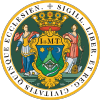Early Christian Necropolis of Pécs (Sopianae)
| Pécs | |||
|---|---|---|---|
| City | |||

Pécs、Clockwise from top left: Cathedral, Széchenyi Square, the Barbakán, Mosque of Jakováli Hasszán pasa, Kossuth Square
|
|||
|
|||
| Location of Pécs | |||
| Coordinates: 46°04′17″N 18°13′59″E / 46.07125°N 18.23311°E | |||
| Country |
|
||
| County | Baranya | ||
| District | Pécs | ||
| Government | |||
| • Mayor | Zsolt Páva (Fidesz) | ||
| Area | |||
| • Total | 162.61 km2 (62.78 sq mi) | ||
| Elevation | 153 m (502 ft) | ||
| Population (1 January 2016) | |||
| • Total | 145,347 |
||
| • Rank | 5th in Hungary | ||
| • Density | 963.43/km2 (2,495.3/sq mi) | ||
| Time zone | CET (UTC+1) | ||
| • Summer (DST) | CEST (UTC+2) | ||
| Postal code | 7600 – 7636 | ||
| Area code(s) | (+36) 72 | ||
| Website | www |
||
| Official name | Early Christian Necropolis of Pécs (Sopianae) | ||
| Criteria | iii, iv | ||
| Designated | 2000 | ||
 |
|
| UNESCO World Heritage Site | |
|---|---|
| Location | Pécs District, Hungary |
| Coordinates | 46°05′00″N 18°13′00″E / 46.0833°N 18.2167°E |
| Area | 16,277 ha (1.7520×109 sq ft) |
| Criteria | iii, iv |
| Reference | 853 |
| Inscription | 2000 (24th Session) |
| Website | www |
|
[]
|
|
Pécs (Hungarian pronunciation: [ˈpeːt͡ʃ]; known by alternative names) is the fifth largest city of Hungary, located on the slopes of the Mecsek mountains in the south-west of the country, close to its border with Croatia. It is the administrative and economic centre of Baranya County. Pécs is also the seat of the Roman Catholic Diocese of Pécs.
The city Sopianae was founded by Romans at the beginning of the 2nd century, in an area peopled by Celts and Pannoni tribes. By the 4th century, it became the capital of Valeria province and a significant early Christian center. The early Christian necropolis is from this era which became a UNESCO World Heritage Site in December 2000.
Its episcopate was founded in 1009 by Stephen I, and the first university in Hungary was founded in Pécs in 1367 by Louis I the Great. (The largest university still resides in Pécs with about 34,000 students). Pécs was formed into one of the cultural and arts center of the country by bishop Janus Pannonius, great humanist poet. Pécs has a rich heritage from the age of a 150-year-long Ottoman occupation, like the mosque of Pasha Qasim the Victorious on Széchenyi square.
...
Wikipedia




